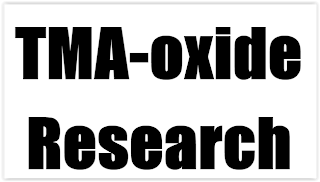Relevance to metabolic/systemic malodors :
I currently think FMO3 overload/deficiency is the main cause of 'metabolic malodors'. FMO3 enzyme oxidizes many sulfides and amines. Dr Stanley Hazen in 2011 suggested there is connection between TMA-oxide levels and atherosclerosis. This has led to much research into FMO3 and trimethylamine whereas FMO3 and TMAU were previously almost completely neglected.
First paper :
The first looked at 720 patients with stable Heart Failure over 5 years and checked to see if there was a TMAO and CVD connection
CONCLUSIONS:
High TMAO levels were observed in patients with HF, and elevated TMAO levels portended higher long-term mortality risk independent of traditional risk factors and cardiorenal indexes.
Paper : Prognostic value of elevated levels of intestinal microbe-generated metabolite trimethylamine-N-oxide in patients with heart failure: refining the gut hypothesis.: Pubmed link
2nd paper :
The 2nd paper looked 112 heart failure patients and checked them for TMAO, choline and betaine levels to see if there might be a connection..
CONCLUSION:
Elevated plasma TMAO, choline and betaine levels are each associated with more advanced left ventricular diastolic dysfunction and portend poorer long-term adverse clinical outcomes in chronic systolic HF. However, only higher plasma TMAO levels was associated with poor prognosis after adjustment for cardio-renal indices.
Paper : Intestinal Microbiota-Dependent Phosphatidylcholine Metabolites, Diastolic Dysfunction and Adverse Clinical Outcomes in Chronic Systolic Heart Failure : Pubmed link
What the Hesart Disease expert community think about TMAO in relation to CVD
I guess the 'TMAO-CVD connection is a new theory and it will take time to see if a consensus is reached whereby TMAO is regarded a/the major heart disease biomarker. At the moment I guess they need to 'convince' the heart disease expert establishment.
It's relevance to metabolic/systemic malodors
For someone who feels that TMAU completely explains their metabolic malodor, since they are likely to come up with a trimethylamine-blocker drug ( a drug that will block bacteria enzymes from converting choline and betaine to trimethylamine, it would in effect mean a cure for TMAU. Those with 'genetic TMAU' would still have the FMO3 fault but there would be no TMA produced in the gut.
However I feel that for most people trimethylamine is not the only source of malodor, and that most will have problems with all compounds that use FMO3 to be oxidized. This may mean many sulfides and amines, but probably mainly a few. So although a 'TMA-blocker' is likely to reduce the load on their FMO3 enzyme, it would not seem to be a cure to me.
But the CVD-TMAO connection means there will millions of dollars of research into understanding FMO3 now, and this is very good news. Previously FMO3 was almost completely neglected . Dr Hazen et al are likely to keep producing many more papers on the subject.


2 comments:
Trinzyme
Trinzyme UK is focused on developing Enzyme Replacement Therapies (ERT) for rare, inherited disorders of metabolism, which currently have no therapeutic alternatives.
I found that interesting since we have not heard yet that trinzyme is supposed to be an enzyme replacent therapy. We only heard 'therapeutic treatment'
Post a Comment